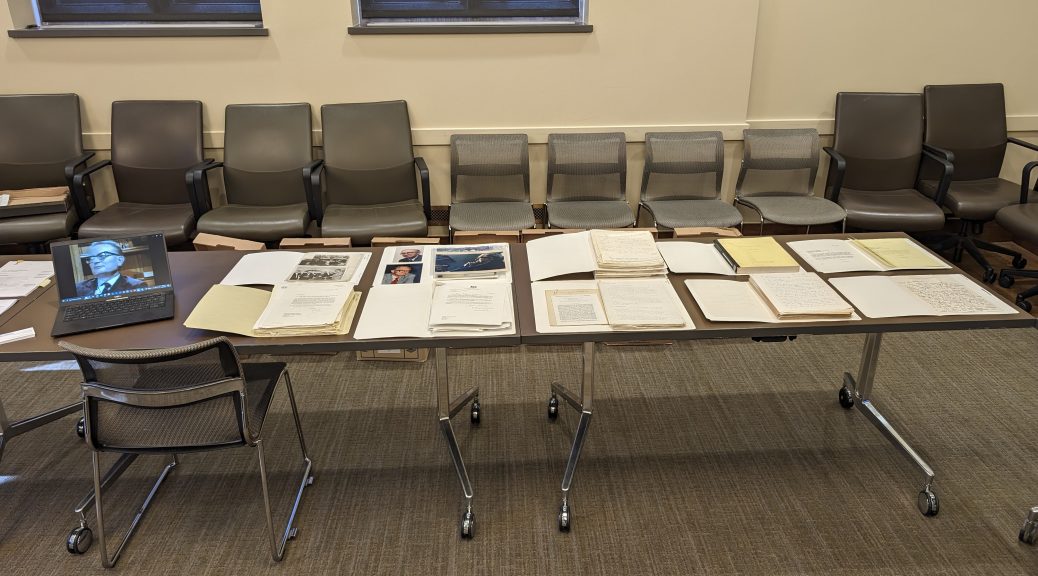Post contributed by Andy Armacost (Head of Collection Development and Curator of Collections), Laura Micham (Director, Sallie Bingham Center for Women’s History and Culture and Curator, Gender and Sexuality History Collections), Zachary Tumlin (Project Archivist, Duke family papers), and Nestor Lovera Nieto (Part-time Research Scholar for the Economists’ Papers Archive and Visiting Scholar at the Center for the History of Political Economy).
Three months ago on Monday, June 10th, around two dozen participants in the Center for the History of Political Economy’s (CHOPE) 2024 Summer Institute met with four staff members from the David M. Rubenstein Rare Book and Manuscript Library for a showing of items in the Economists’ Papers Archive (a joint venture between CHOPE and the Rubenstein). The Summer Institute was started in 2010 with funding from the National Endowment for the Humanities and is an annual two-week long event that brings together faculty and PhD students in economics to examine various topics in the history of the field. This year’s focus was on preparing participants to design and teach their own undergraduate-level course on the history of economic thought, along with showing how such concepts and ideas might be introduced into other classes.
Andy Armacost
While many of the collections in the Economists’ Papers Archive relate to documenting the careers of individual economists, the archive also holds some related collections that offer a larger context for the history and range of work that encompasses this discipline.
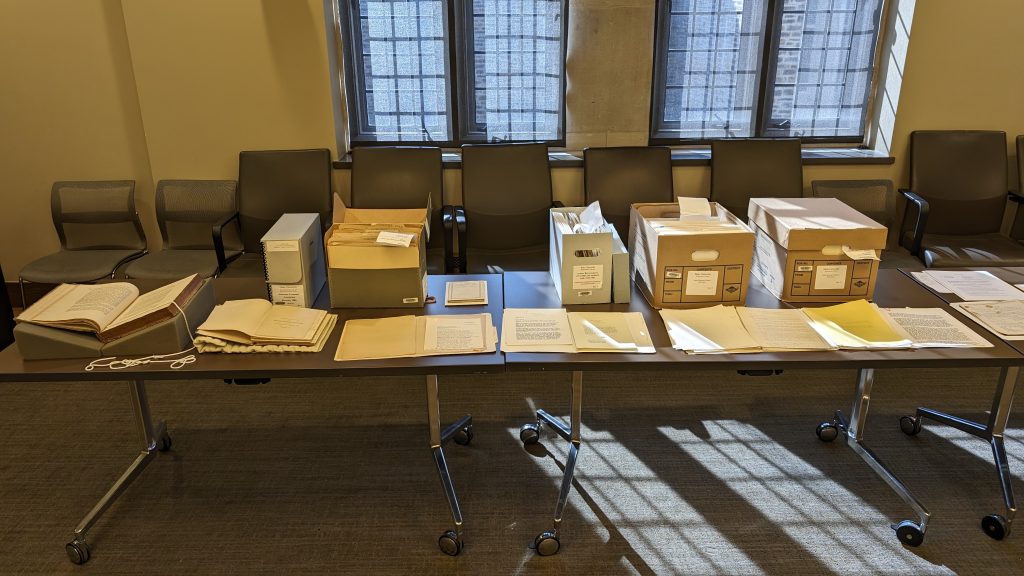
One goal of the Archive is to chronicle the historical development of the field, and a key early work in this narrative is Adam Smith’s An Inquiry into the Nature and Causes of the Wealth of Nations, published in 1776. This work explores the role of markets, international trade, and economic decision making. In it, Smith famously describes market forces acting as an “invisible hand” that guides economic decision making.
The Archive also holds organizational papers, including those of the American Economic Association (AEA; founded in 1885) and its journal American Economic Review. These papers represent more than a century of economic thought and the participation of a broad range of economists, and include correspondence from international economists like John Maynard Keynes, who corresponded on behalf of the Royal Economic Society.
The Archive also holds the papers of economists working in government, such as Federal Reserve Chairman Arthur Burns, who served during the Nixon administration. This collection preserves correspondence between the President and Chairman and their discussions related to economic policy and decisions related to the administration’s ending of the gold standard for US currency.
Laura Micham
The Economists’ Papers Archive holds the papers of several notable women economists, such as Anita Arrow Summers, Anna Schwartz, Juanita Morris Kreps, Charlotte DeMonte Phelps, Barbara Bergmann, and Mary Morgan. Though these scholars emerged from a range of backgrounds and intellectual traditions, and each took different professional paths, they all seem to have been animated by an interest in living independent lives and a realization that financial independence was crucial to that goal.
During this event, I shared materials from each of these collections that offer a window into these women’s contributions to the field of economics and to society:
- Professor Anita Arrow Summers’s graduate student work in Professor Jacob Viner’s class during the mid-1940s in the University of Chicago Economics Department.
- Memos and other correspondence between Professor Juanita Morris Kreps and President Jimmy Carter when she served as Secretary of Commerce in his administration.
- A hand-written manuscript detailing Professor Barbara Bergmann’s groundbreaking scholarship on women and children, “A ‘Cost-Sharing’ Formula for Child Support Payments.”
- Heavily annotated writings of Professor Charlotte DeMonte Phelps documenting her contributions to behavioral economics.
- A colorful box of materials from the recently acquired Mary Morgan papers alongside annotated drafts of her 2017 book chapter, “Glass Ceilings and Sticky Floors: Drawing New Ontologies.”
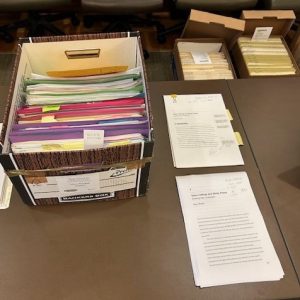
Zachary Tumlin
My goal was to show different types of material to illustrate the ways in which a researcher might use our collections. Correspondence is typically the most sought-after material, but writing, teaching, and professional service files can also be valuable to researchers. We also hold electronic records and audiovisual material.
- Three folders of correspondence, ranging from a single handwritten letter from John Nash (1953) to one of five folders with Ta-Chung Liu (1959-1975). Liu was clearly not just one of Nerlove’s former professors, but also a close friend.
- Lecture notes for “Introduction to Econometrics” (1948), taught by Jacob Marschak at the University of Buffalo. This collection includes a large amount of teaching material created by Nerlove over the course of his 60-year career, plus a smaller amount created by others.
- Two of four folders for Atkinson’s article “On the Measurement of Inequality” (1970), which has been cited over 10,000 times. This file includes not only the published version but drafts and notes, which show how this notable writing came to be.
- One of three folders related to Atkinson’s knighthood, including the initial offer letter (2000) asking if he would like to accept. This collection includes an atypical amount of personal material and offers insight into his hobbies and family relationships.
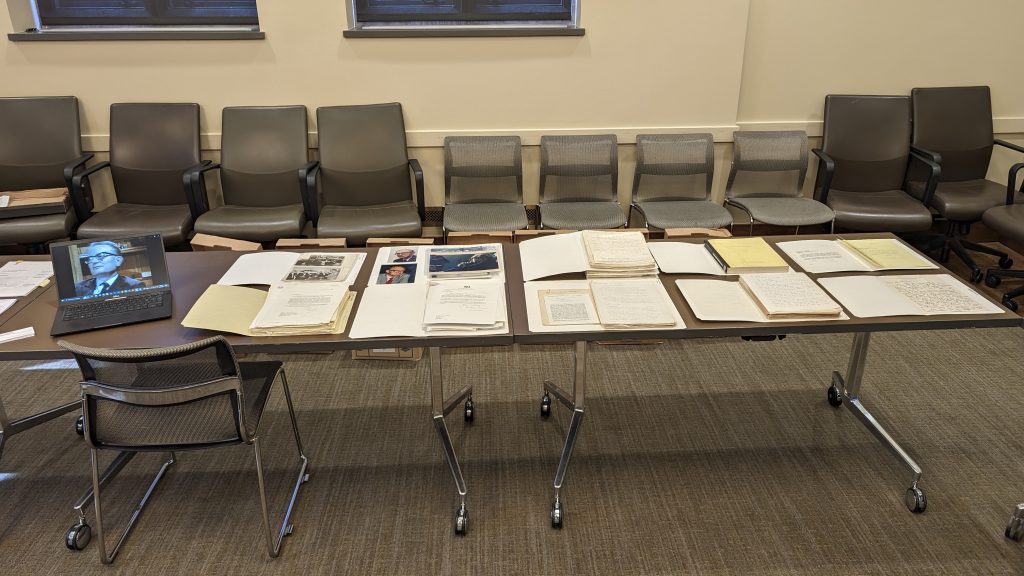
A representative folder from the Bologna Claremont Monetary Conferences series that is full of correspondence. Hinshaw was the “primary driver” behind this conference series, which “brought together Nobel Prize winners and high-level diplomats, businessmen, and politicians to discuss current world developments.”
Raymond C. Battalio and John B. Van Huyck papers
A demo of a Bayesian learning experiment copied from a 3.5” floppy disk that can be played by a single individual against a simulated opponent using DOSBox. This experiment came from the Economic Science Laboratory at the University of Arizona and is copyrighted 1991-1993, when Vernon Smith was still there.
A digitized copy of “The Economy Prize” (1970), which contains an interview with Samuelson, originally on 16mm film.
Nestor Lovera Nieto
“Correspondence can help researchers to better understand the development of economic thought, the public and private motives of individuals, and the process of interaction within and across intellectual communities” (Weintraub et al. 1998, 1498).
This citation was my inspiration for choosing most of the materials that I wanted to show to the participants of the Summer Institute. As a researcher in the history of economic thought, I believe that correspondence can contain valuable information that can be the starting point for not only writing a paper but also initiating a research project.
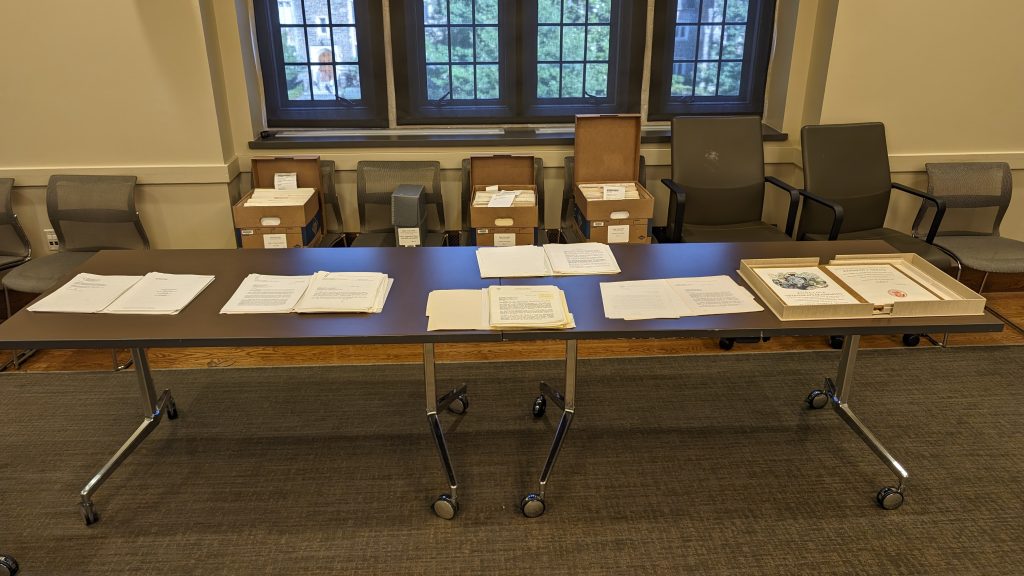
Treynor’s correspondence file on Fundamental Indexation, which contains debates between various individuals on the subject. This was unusual for him because he otherwise arranged correspondence by person or date.
- Arrow’s correspondence file for Janet Yellen (the current US Treasury Secretary), which includes letters of recommendation from him.
- One folder from Arrow’s file on ECON 200 at Stanford University, which was a course that he taught on the history of economic thought. This folder includes a syllabus and correspondence.
- The certificate that accompanied Arrow’s Nobel Prize medal, which he was awarded in 1972 for his contributions to general equilibrium theory and the welfare economy.
One folder from Samuelson’s correspondence file with Arrow, which includes exchanges that illustrate the disagreement between these two regarding the Bergson-Samuelson social welfare function.
Weintraub, E. Roy, Stephen J. Meardon, Ted Gayer, and H. Spencer Banzhaf. “Archiving the History of Economics.” Journal of Economic Literature 36, no. 3 (1998): 1496–1501.


